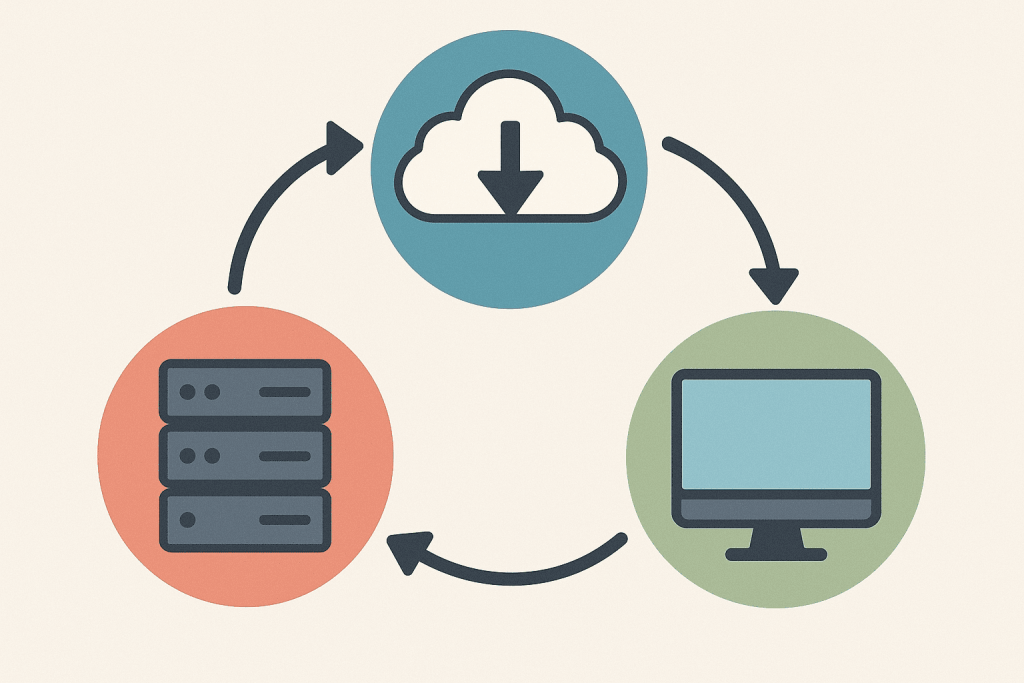
In the digital era, data has truly become the most valuable business asset. Losing a customer database, email archive, or even a few gigabytes of information can lead to serious financial losses or downtime. That’s why backups are no longer an “option” — today, they are an essential part of any IT infrastructure. And while just a few years ago copies were stored only locally, now cloud-based solutions are increasingly used — directly integrated with VPS and dedicated servers.
Cloud Backup: How It Works
A cloud backup is the process of creating copies of data on remote servers located in the provider’s data centers. In case of failure, a virus attack, or user error, this data can be quickly restored. The key advantage is that the copies are stored separately from the system’s main server — in a protected environment. This ensures that even in case of hardware failure or loss of access to the main VPS, the information can be restored in just a few clicks.
Integration between the cloud backup system and the server is done through special agents or API connections. For example, in the case of a VPS, a user can connect a backup system directly through the control panel or install software that automatically syncs data with the cloud. For dedicated servers, integration occurs at the file system level — either the entire disk or specific directories are copied.
Flexibility and Automation
One of the main advantages of modern cloud solutions is automation. Users can set their own backup schedule — from hourly to weekly — define which files or databases should be included, and choose how long the copies are retained. This is especially important for businesses with constantly changing data: e-commerce stores, CRM systems, or dynamic web platforms.
Automated backups eliminate the need for constant manual control and reduce the risk of human error. If, for any reason, the backup fails, the system sends a notification or email alert so that the issue can be resolved immediately.
Security and Data Encryption
Security is one of the key concerns when using cloud services. VPS and cloud backup providers apply multi-layered protection: data encryption during transmission (TLS/SSL) and storage (AES-256), multi-factor authentication, and geo-replication across multiple data centers. This means that even if one location fails, your backup files remain accessible from another.
Additionally, users can choose where the copies are stored — within their own country or abroad. For some companies, this is important for compliance with data protection and privacy regulations.
Integration with VPS: Speed and Control
For VPS owners, the main priorities are speed and control. Cloud backups integrate directly with virtual machines without affecting the performance of core services. Solutions integrated via the provider’s API can create system snapshots that allow restoring the server to a previous state at any given date. This is especially useful for developers and businesses that frequently update their websites or applications: if something goes wrong after an update, the server can be rolled back instantly.
Some platforms also offer incremental backups — only files that have changed since the last backup are copied. This saves both disk space and transfer time, which is critical when handling large volumes of data.
Cloud Backups for Dedicated Servers
Dedicated servers offer even more advanced backup options. Since the user has full system access, they can set up not only automatic file copies but also complete system snapshots, disk images, or real-time database replication.
These solutions often integrate with corporate cloud storage or IT management systems. For instance, companies use tools that allow centralized control over all servers and backups, define storage and recovery policies, and manage long-term data archiving.
Popular Services for VPS and Servers
There are many backup platforms on the market today, but several are particularly well-suited for integration with VPS and dedicated servers:
Wasabi Cloud Storage — a fast and affordable storage solution compatible with Amazon S3. It is often used alongside Veeam, MSP360, and other backup systems. Wasabi has data centers in Europe, ensuring low latency for Ukrainian users.
Backblaze B2 — a scalable cloud storage service with low per-gigabyte costs. It’s suitable for both small VPS instances and large dedicated server infrastructures. Backblaze supports API integration and incremental backups that reduce bandwidth usage and backup time.
MSP360 (CloudBerry) — a professional business solution that enables centralized management of backups on Windows and Linux servers. It includes an administrator control panel and supports integration with multiple cloud providers, including Wasabi and Backblaze.
If you’re renting a server from a major provider, it’s worth checking whether they offer their own built-in backup system — this is often the simplest and fastest option since everything is integrated at the platform level.
The Future of Backup Lies in Hybrid Solutions
The current trend is combining local and cloud backups. This hybrid approach ensures maximum reliability: copies are stored both on the server itself and in the cloud. In case of minor issues, data can be restored from local storage, and in case of serious failures — from the cloud.
Hybrid solutions are especially convenient for companies that value flexibility and scalability. They allow storage expansion without upgrading physical hardware and can be integrated into any IT ecosystem — from enterprise servers to small VPS instances hosting websites.
Conclusion
The integration of cloud backup services with VPS and dedicated servers has ushered in a new era of data reliability and security. Today, backups have become just as critical a part of infrastructure as the system itself. The cloud removes the burden of maintaining physical storage, adds scalability, and enables instant recovery during emergencies.
In the future, this field will continue to evolve: intelligent algorithms will automatically determine file priority, and server–cloud integration will become even deeper. If you’re using VPS or dedicated servers, now is the perfect time to consider implementing a cloud backup strategy and choose the service that best fits your needs.

Leave a Reply